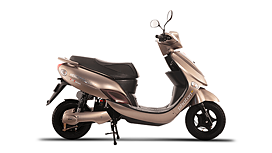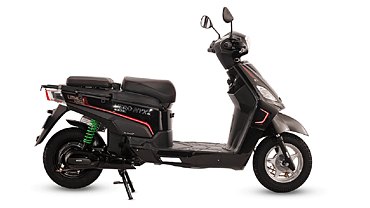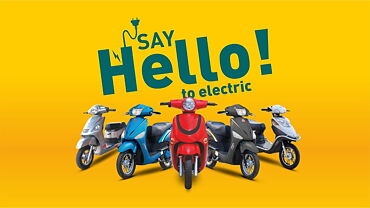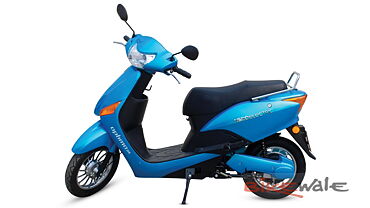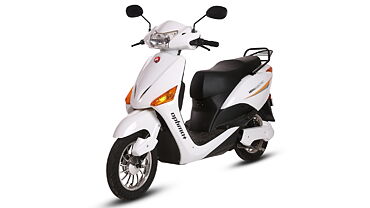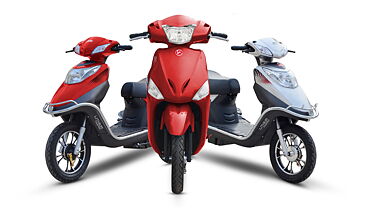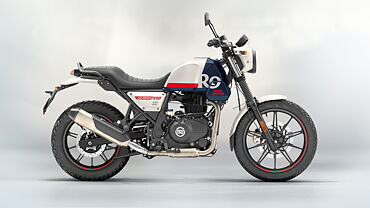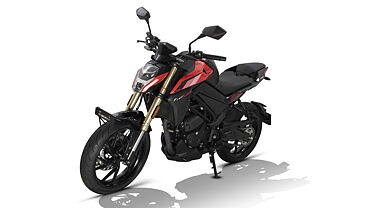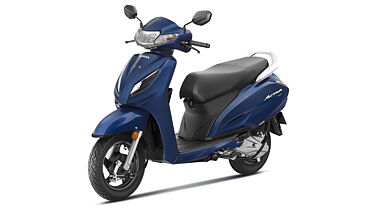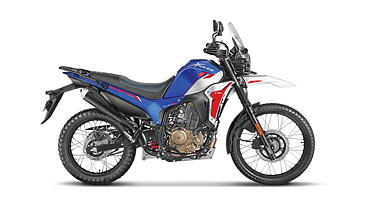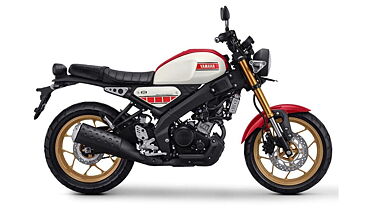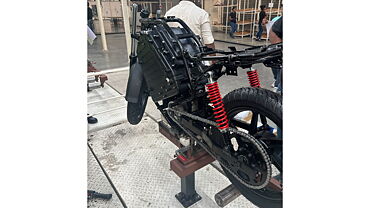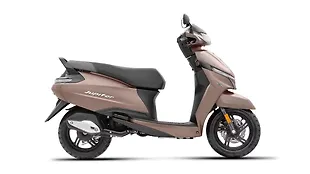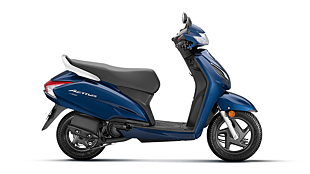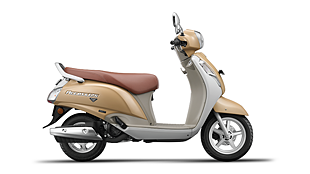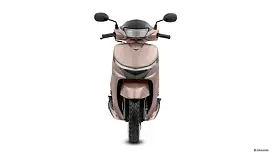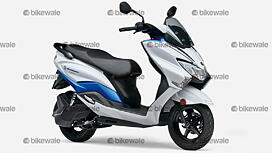Page 1

A scooter usually has a very straightforward purpose of existence – to get the user from point A to point B with least amount of hassle. The formula is simple and very few manufacturers have tried to stray from this path. There are a few who choose to be different, take the path less trodden and attempt to offer something distinctive, something unorthodox. This different way might take a lot more time and effort to materialise, and still might be a far cry from what consumers expect. But what if this will be the only path left, a few years from today? Will we still deem it as unworthy of consideration, or will we then sit up and start taking notice of it?
While this might hint towards more environment-friendly means of transportation like cycling, I’m actually referring to electric vehicles.

Electric vehicle manufacturers usually are small startup outfits with a very limited sales and marketing network. One of the biggest advantages of electric vehicles is their low maintenance, which can sometimes be a problem for the company’s service division. The dearth of business in the service and parts department and the lack of a company’s track record can make convincing businessmen to invest in a dealership a laborious task. A few global companies like Energica and Tesla have made their mark in the automotive industry, though it wasn’t without the backing of a few multimillionaires. India’s very own Reva Electric also struggled with promoting electric cars in the country before its efforts were recognised by Mahindra, who acquired the Bangalore-based outfit in 2010.

Since the past couple of years, Hero Electric (no association with Hero MotoCorp) has been trying its hand at getting people overcome their fears of electric vehicles. The company’s portfolio consists of seven scooters and two ‘electric cycles’. The company’s flagship scooter, the Hero Electric Photon recently visited the CarWale garage and even though Hero Electric promises a range of 80kms, none of my colleagues were ready to risk getting stranded by the side of the road. My commute barely involves 12 kilometres of travel both ways and so, the keys to the Photon eventually landed on my desk. Also as my house is on the ground floor, charging the scooter wasn’t going to be a problem. And though I wasn’t exactly happy to ditch my RX135 for an electric scooter for the daily commute, a major malfunction in my motorcycle meant that I had run out of options.

Page 2

The Hero Electric Photon is a full-sized scooter that manages to hold its own among other regular petrol powered counterparts. With a touch of retro styling, the Photon gets a very simple and clean design. Passing references about its resemblance to the Vespa aside (yes, you get a lot them at traffic signals and parking lots), the white colour scheme and the loud decals make the Photon stand out from the crowd, though I personally feel that it looks way better in its black avatar. It also gets fancy 10-inch alloys which lend it a premium look.
The Photon comes with a stylish smart key which has controls for remote locking and the alarm. The Photon gets a generous under seat storage bay, which can hold a full-sized helmet, as well as its charger. The under seat storage space also houses a 12 volt socket and a circuit breaker, in case of emergencies. There is a small storage compartment at the front too.

While Hero Electric’s description of the Photon as a high speed e-bike might bring up images of superbikes in your mind, it is actually limited at just 45kmph. And though the 45kmph speed makes it relatively faster than the other host of electric scooters sold in India, you cannot really compare it with other petrol-powered scooters in the market. The Photon comes with a High (Power) and Low (Economy) switch. The Economy mode is supposed to maximise the range of the Photon, which means that the top speed is restricted to 30kmph. The Power mode on the other hand has a higher top speed of 45kmph, though the range in this mode is significantly hampered. The riding modes can be switched on the move, and can be very useful when you need to quickly overtake someone (no, it is not as effective as a NOS switch).
The Photon comes with an alarm system which can get really loud and irritating, especially at times when you park the scooter in an underground parking lot, where loud noises tend to echo. The battery level indicator finds its place in the instrument cluster and seemed to have a mind of its own. When on the move, the level kept fluctuating depending on the accelerator’s position.


Highways aren’t the Photon’s cup of tea. While the crosswinds don’t pose a big problem, highway rides can be quite unnerving due to lack of power. Overtaking requires a lot of planning, patience and courage. All kinds of vehicles, including cars, motorcycles, trucks, busses and rickshaws easily outpace the Photon, with Venkat claiming to have been overtaken even by a TVS Super XL. Riding up steep inclines can also get very tasking (though this largely depends on the rider’s weight).
Page 3

Though the manual says that the battery level shouldn’t be taken below 30 per cent, in an attempt to check the battery’s behaviour, I kept on riding the Photon even with the needle precariously close to reading ‘Empty’. Everything went smoothly for a couple of kilometres when suddenly, the motor frantically started turning on and off, even with the throttle wide open. Then, with the needle planted on E and the battery just about to die, I had to turn off the headlamp to ensure I could crawl back home. Turning off the headlamp did prove to be effective in pushing the scooter’s range by a few hundred metres, though we strongly advise that it should be used only as a last ditch effort and on a well lit road.
The heavy battery is placed above the rear wheel, which means that the Photon has a high centre of gravity (CG). While this isn’t a problem while ambling through traffic, this high CG makes the Photon quite unpredictable while manoeuvring around its top speeds. This has also adversely affected the scooter’s suspension and you can feel every bump and crater on the road. And as the Photon is primarily meant to be the ridden in the urban environment, it is quite disappointing that the scooter underperforms in this division.

The Photon’s charger is compatible with the regular three pin plug and I found it very easy to charge it, as I could pass the charger cable through my house’s window. At one instance, my colleagues and I even managed to shove the Photon into the elevator of a friend’s building, take it upto the fifth floor and ride into his house, as we could not find a usable charging point on the ground floor. After getting upto full charge the next morning, we managed to sneak out of the building without getting noticed by other residents.
Maintenance wise, there are very few things that could go wrong in an electric scooter. Unlike petrol scooters, which require a service every few thousand kilometres, the only bit of maintenance required in a Photon is the battery replacement. A set of battery usually lasts up to 20,000kms or two years, by which time the lead and acid in the battery crosses its expiry date. It costs around Rs 10,000 to replace the battery which can get quite heavy on the pocket, though Hero Electric does have a ‘super saver battery scheme’ which allows customers pay for their next battery in advance through 12 EMIs.

Motorisation is increasingly challenging our country's traffic system, and affecting the daily life in urban areas through traffic congestion and pollution. In such a case, electric vehicles can play a major role in reducing the expenditure, pollution as well as our dependability on fossil fuels. China, with its draconian laws prohibiting usage of private petrol vehicles for small distance travels, has today become the world’s largest consumer and exporter of electric two-wheelers, and the results of this speak for themselves.
In India though, the market for electric scooters is still in a very nascent stage and they are still not looked upon as serious contenders to the regular petrol powered counterparts. In the long run, electric scooters have the potential to eat into the petrol-powered scooters’ market share, though the lack of infrastructure and their modest operating range means that the market for electric scooters is very limited. There also exists a mental block among consumers which prevents them from even considering buying an electric vehicle, though the truth is that when used sensibly, an electric scooter is just what the doctor ordered (or in this case, the environmentalist).

Hero Electric definitely deserves kudos for introducing the Photon, but the fact remains that at Rs 52,790 (ex-showroom Mumbai) it is quite an expensive proposition. In case the Photon is getting out of your budget, you can also look at the E-Sprint, which is the other product in Hero’s ‘high speed e-bike’ range. You can also avail of easy financing options that Hero Electric offers at the dealership level.
Either way, the Photon is a giant leap forward for electric scooters in India. It is very much usable for small rides within the city and even short distance commutes. Though I wasn’t very happy with the prospect of using an electric scooter in the beginning, the Photon slowly grew on me and turned out to be the perfect example of how you cannot judge a book by its cover. So if you have a very limited use for a scooter and wish to do your bit for the environment, the Photon is definitely worth considering.

Gallery
1/21
Double Tap to Zoom
























